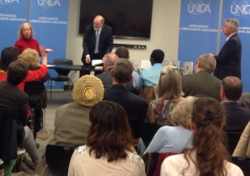back to home page |
Authors-for-Literacy Readings at the United Nations
Presentation by UN historian, Stephen Schlesinger at the 40th anniversary of the UN Staff One Percent for Development Fund
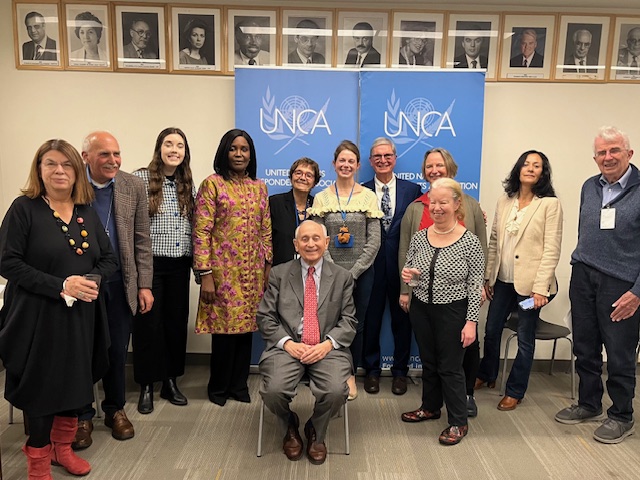 UN historian and author Stephen Schlesinger with members of the UN Staff One Percent for Development Fund
Author Stephen Schlesinger and Pat Duffy of the UN 1% Fund
13 June, 2019
Presentation by Paul Auster 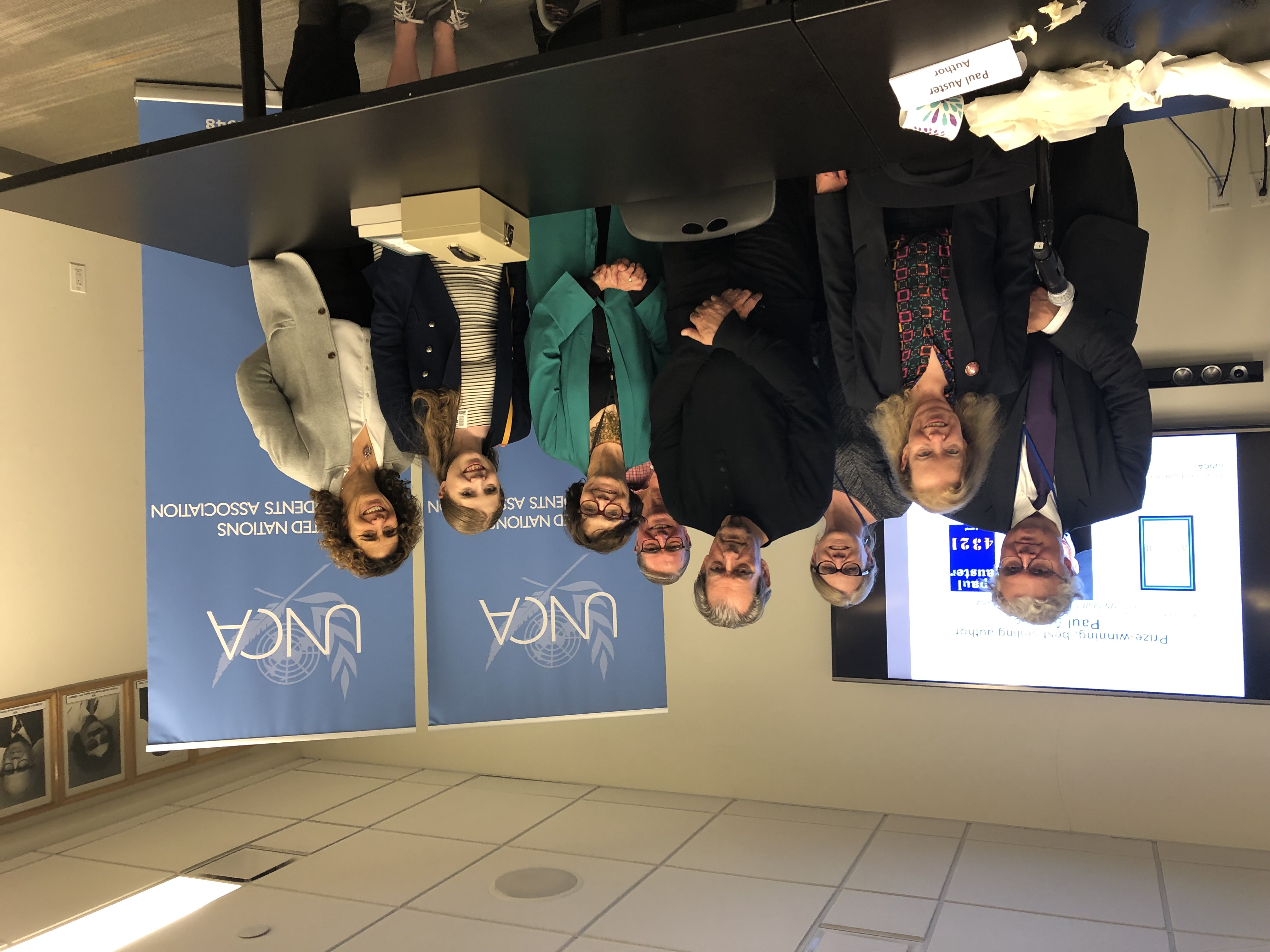 Paul Auster with UN One Percent Fund members + volunteers |
May, 2018
Presentations by Elizabeth Strout, Katherine Vaz and Major Jackson
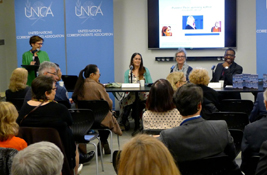 Pat Duffy introduces authors -photo by Francoise Bouffault |
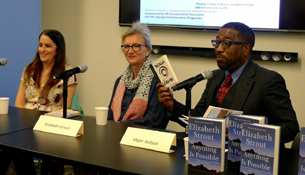 L-R: Katherine Vaz, Elizabeth Strout and Major Jackson -photo by Francoise Bouffault |
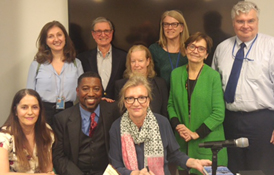 1% Fund members Elizabeth Scaffidi, Chuck Appel, Alice Harrison, Kathryn Kuchenbrod, Pat Duffy and Robert Johanssen with guest authors -photo by Francoise Bouffault |
|
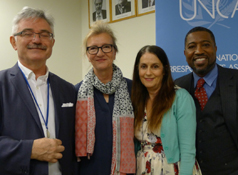 Francis Dubois with guest authors Elizabeth Strout, Katherine Vaz, Major Jackson -photo by Francoise Bouffault |
|
Did anyone ever die in your arms? That was a question often put to Nathan after Vietnam. People needed to look at someone who had looked at that. They wanted to paint a few scenes and run them together, to enjoy the shudder at a distance, coloring in the details at their leisure – the single, one hundred shades of green.” “The UN Somali driver speeds by a small herd of white cattle prodded along by a desert farmer. from “The Dadaab Suite” from Roll Deep by Major Jackson “…And then Angelina saw her mother suddenly rise and walk into the street. An old man was crossing, he was weaving – not with drunkenness, it seemed, but with some malady of age. It was surprising to Angelina how quickly her mother moved to him; in the light from the streetlamp Angelina saw the old man’s face, and it was not just the way he smiled up at her mother, it was the humanness of his expression, the warmth and depth of his appreciation, and as her mother helped him across the street, Angelina saw then her mother’s face briefly in the light as well. Perhaps it was the angle of the light, but her mother’s face had a momentary brilliance upon it—as Angelina saw her mother take the man’s hand, saw her mother help this man across the street…” from Anything is Possible by Elizabeth Strout
|
![]()
June, 2017
Presentation by Patricia McCormick, author of Sold!
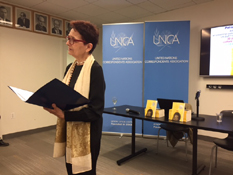 Pat Duffy updates on 1% fund projects |
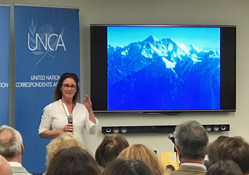 Patricia McCormick, author
|
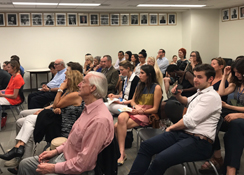 Audience
|
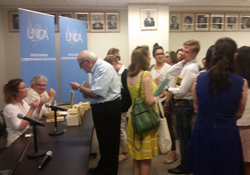
Book Signing
|
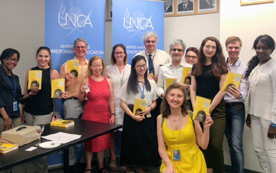
Author Patricia McCormick with 1% Fund team of volunteers:
|
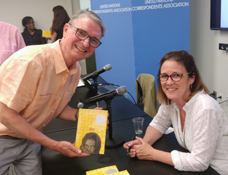 Author Patricia McCormick with 1% fund Secretary Chuck Appel |
Robert Johanssen, Josh Cohen, Pat Duffy, Suzanne Tisserand, Sergei Zalesov, Andrea King, Liz Scaffidi
|
HAPPINESS HOUSE “Finally we turn down an alley and arrive in front of a metal gate held fast with a heavy chain. Uncle takes a key from his vest, opens the lock and hurries me inside. “Will Auntie be here?” I say. “Who?” He is distracted, locking the chain behind us. “Auntie Bimla,’ I say. “Will she be here?” “Later,” he says. “She’ll be here later.” Beyond the gate, a man lies sleeping in front of a door. The place is dark as a cave, and it smells of liquor and incense. As my eyes adjust, I see a dozen sleeping girls, some in the corners, some on rope cots. “What kind of place is this?” I ask uncle. “Happiness House,” he says. “Auntie Mumtaz will explain it all to you.” |
![]()
May, 2016
Presentation by Christopher Cerf and Henry Beard, authors of
Spin-glish: the Definitive Dictionary of Deliberately Deceptive Language
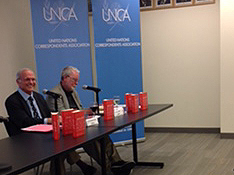 Authors Christopher Cerf and Henry Beard |
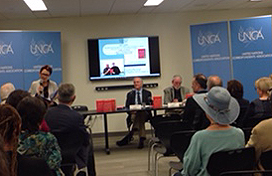 Pat Duffy, Chris Cerf, Henry Beard, audience
|
Audience, with (l to r): Alice Harrison,
Francis Dubois |
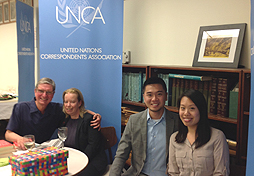
Chuck Appel, Alice Harrison, Kam Cheong Chiu, Melissa Tam
|
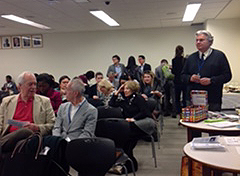 Audience, with Robert Johannsen, standing |
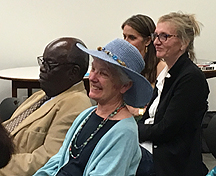 Prof. Kasozi, Kate Parry, Katherine Vaz, Liz Strout |
|
Do you speak Spin-glish? Well, if you speak English, chances are you’ve been using Spin-glish for a long time, most likely without even knowing it. For example, have you ever overslept and missed a meeting and blamed your absence on a “scheduling error”? Tried to weasel out of a parking ticket because of an alleged “meter malfunction”? Explained that a bounced check was the result of an “unanticipated negative cash-balance accounting issue”? |
![]()
June, 2015
|
Pat Duffy, Roger Lipsey, Francis Dubois |
Roger Lipsey speaks |
(l to r): Susan Lin, Liz Scaffidi, Alice Harrison, Chuck Appel, Roger Lipsey, Jane Asante, Robert Johannsen, Pat Duffy, Andrea King |
|
|
Book Signing |
Pat Duffy with Roger Lipsey |
|
"Hammarskjöld knew two unlike worlds very well. The world of politics and political leaders, deception and honesty, violence and kindness, reflection and the search for solutions. And another world: a world of inwardness and prayer, of self-scrutiny and ancient wisdom, of periodic return to ‘a centre of stillness surrounded by silence that nourishes, situates and restores'. In the first world he was nearly always with people. In the second, nearly always alone with his own person and his God. In both worlds he was a lifelong inquirer with initiative; it wasn’t enough to pass through, contributing cautious splashes of oneself here and there. In the world at large he strove to summon the best of himself, look carefully and imaginatively, and act as wisely as possible."
|
|
|
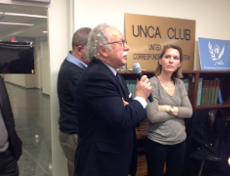 Giampaolo Pioli of UNCA, with Sabina Altumbabic of LCP
|
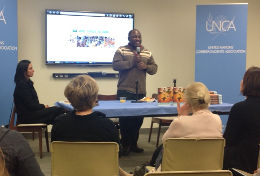 Uwem Akpan, the author
|
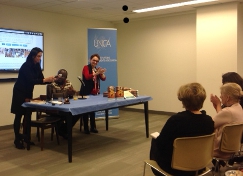 Pamela Falk of UNCA, Pat Duffy of 1% Fund
|
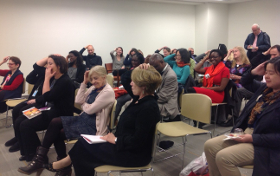 Audience Participation |
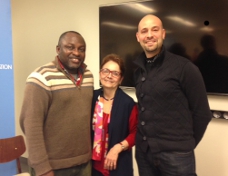 Uwem Akpan, Pat Duffy, Marco Comandini |
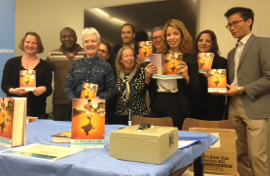 1% Fund and event volunteers |
|
I’m nine years and seven months old. I’m home playing peekaboo in my room with my little brother, Jean. It’s Saturday evening and the sun has fallen behind the hills. There’s silence outside our bungalow, but from time to time the evening wind carries a shout to us.” Our parents have kept us indoors since yesterday. Maman comes into the room and turns off the light before we see her. Jean cries in the darkness, but once she starts kissing him, he begins to giggle. He reaches up to be held, but she’s in a hurry. “Don’t turn on any lights tonight,” she whispers to me. “Come with your brother.” I carry jean and follow her. “And don’t open the door for anybody. Your papa is not home, I’m not home, nobody is home. Do you hear me, Monique, huh?” “Yego, Maman.” “Swallow all your questions now, bright daughter…” ---from “My Parents Bedroom”, Say You’re One of Them by Uwem Akpan |
![]()
February, 2014
Historian and UN Scholar, Stephen Schlesinger
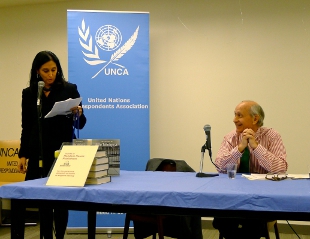
Pamela Falk (UNCA President), Stephen Schlesinger
|
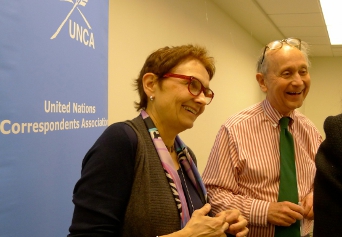 Pat Duffy with the Author |
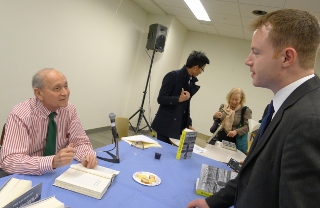 Stephen Schlesinger, Aug Lin, Alice Harrison, Peter O'Connor |
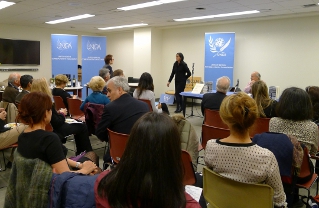 The Audience |
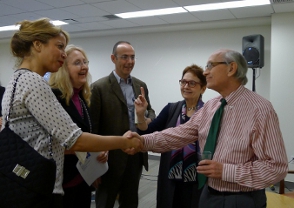 Naima Charafi, Deborah Fairchild, Javier Zanon, Pat Duffy, Stephen Schlesinger |
|
To Eleanor Roosevelt March 4, 1961 Dear Mrs. Roosevelt, I have just returned from Latin American to find your most welcome letter. I hesitated a long time before accepting President Kennedy's invitation to come to Washington, because I regard myself as essentially a scholar and a writer, and hated the thought of interrupting my work on "The Age of Roosevelt"; but in the end, I reflected that no American historian has ever been privileged to watch the unfolding of public policy from this particular vantage point, and I concluded that I could not decline. I know this experience will very much enrich my historical understanding. The best news of all is that you have agreed to rejoin the Delegation to the U.N.! Sincerely yours, Arthur --from The Letters of Arthur Schlesinger Jr., edited by Andrew Schlesinger and Stephen Schlesinger |
November, 2012
Reading by Pulitzer - Prize - winner Elizabeth Strout
Front row: Elizabeth Scaffidi, and author Elizabeth Strout
Back row: Michael Cassandra, Francis Dubois, Tyler Radford,
Razmee, Muriel Glasgow, Nancy Colbert, Pat Duffy, Alice Harrison
|
Audience members arrive for the reading by Elizabeth Strout, from her books Olive Kitteridge and her forthcoming novel, The Burgess Boys |
|
|
|
||
December, 2011
Reading and presentation of Oscar Hijuelos
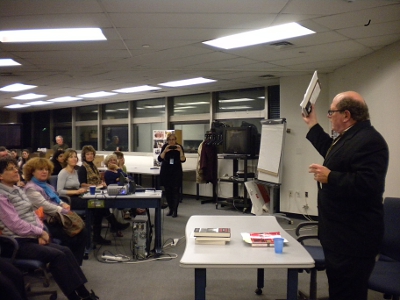
|
Excerpt from The Mambo Kings Play Songs of Love |
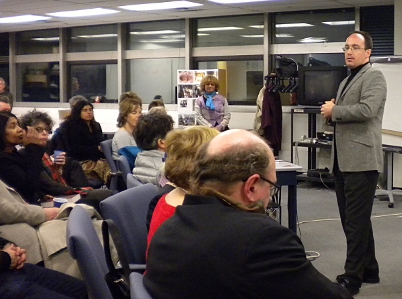 Emmanuel Soyer, Head of UN Language Programme, welcomes audience at Oscar Hijuelos reading |
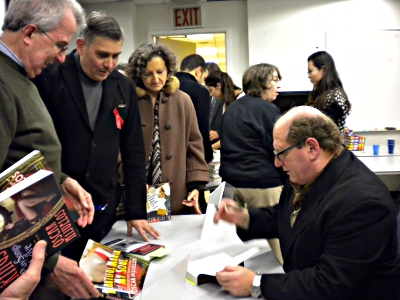 Pulitzer-prize-winning author, Oscar Hijuelos, signing books |
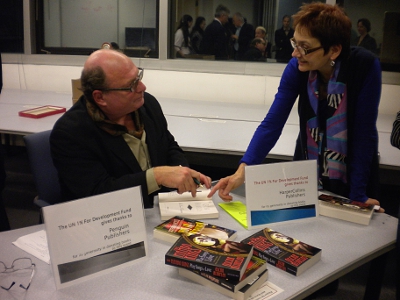 Author Oscar Hijuelos and Event team member Pat Duffy |
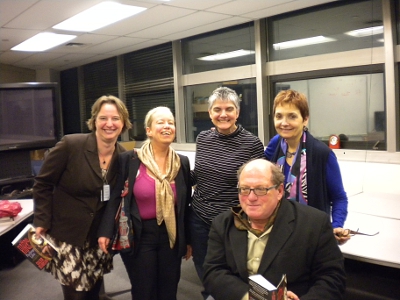 Post-reading reception with Oscar Hijuelos with (from l to r): Jodi Nooyen, Alice Harrison, Marlenys Villamar, Pat Duffy |
![]()
October, 2008
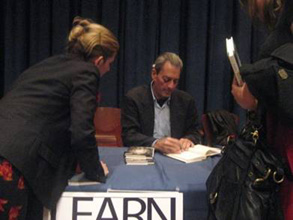 Paul Auster signing books |
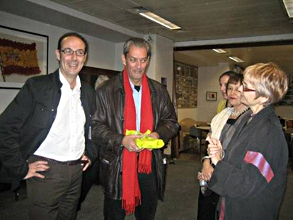 Post-reading reception for Paul Auster: Historic UNCA Club (l to r: Javier Zanon, Paul Auster, Mary Regan, Francoise Bouffault, Pat Duffy) |
|
Excerpt from Man in the Dark “…The night is still young, and as I lie here in bed looking up into the darkness, a darkness so black that the ceiling is invisible, I begin to remember the story I started last night. That’s what I do when sleep refuses to come. I lie in bed and tell myself stories. They might not add up to much, but as long as I’m inside them, they prevent me from thinking about the things I would refer to forget. Concentration can be a problem, however, and more often than not my mind eventually drifts away from the story I’m telling to the things I don’t want to think about. There’s nothing to be done. I fail again and again, fail more than I succeed, but that doesn’t mean I don’t give my best effort.” (p. 2) |
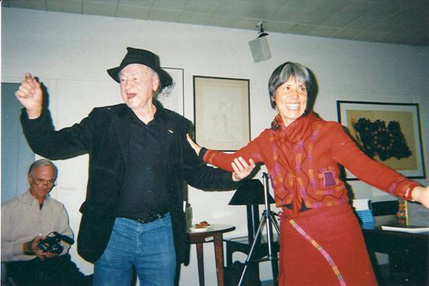
Filmmaker Jonas Mekas and poet Cecilia Vicuna in UNCA Club, post-reading
| Excerpt from Instan by Cecilia Vicuna “Being” is a compound of three forms: “to grow”, “to set in motion” And “yes it may be so.” To be not an estar, but a way of being.” |
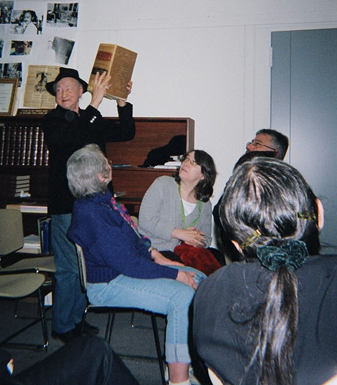
Filmmaker Jonas Mekas celebrates the Lithuanian language
International Mother Language Day Reading
February, 2009
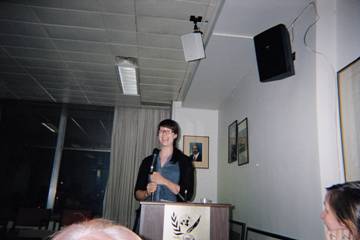
Elizabeth Little
|
Excerpts from Biting the Wax Tadpole: Confessions of a Language Fanatic |
![]()
New York Opera Society
November 2008
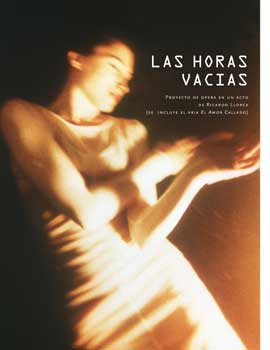
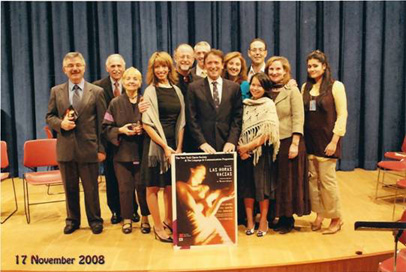
Volunteers for the Opera Society Event
Click here to return to web-page International Year of Languages
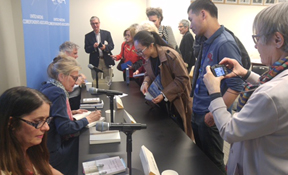 Book Signing
Book Signing